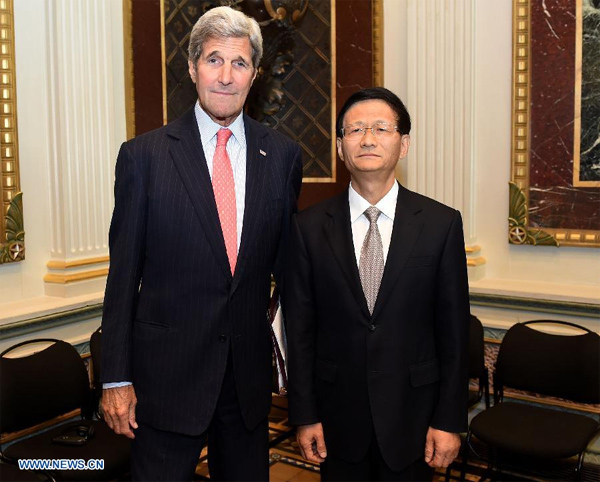US should give up its hegemony in cyberspace
Updated: 2015-09-15 08:16
By Shen Yi(China Daily)
|
||||||||
 |
|
President Xi Jinping's special envoy Meng Jianzhu, a member of the Political Bureau of the Central Committee of the Communist Party of China (CPC) and head of the Commission for Political and Legal Affairs of the CPC Central Committee meets with U.S. Secretary of State John Kerry, in Washington D.C., capital of the United States, Sept. 11, 2015. China and the United States have reached important consensus on combating cyber crimes. [Photo/Xinhua] |
High hopes have been placed on President Xi Jinping's state visit to the United States, because many believe it could boost bilateral cooperation in cybersecurity in times of a looming "war" over cyber theft. In fact, cybersecurity is expected to top the agenda of the meetings between President Xi and his US counterpart Barack Obama.
These are challenging times for China and the US both, as the Obama administration is reportedly working on a package of economic sanctions against Chinese companies and individuals that Washington claims have benefited from the alleged cyber-theft of valuable US trade secrets. Actually, China-US disputes intensified even before former National Security Agency contractor Edward Snowden exposed the US' aggressive surveillance program at home and abroad more than two years ago causing huge embarrassment for Washington. Other countries' leaders, including German Chancellor Angela Merkel, corporations and organizations all have become US surveillance targets, according to Snowden.
At the beginning of 2013, US private security company Mandiant released a report, titled "APT1: Exposing One of China's Cyber Espionage Units", which accused the Chinese military of stealing US intellectual property. The US administration went a step further by indicting five Chinese military officers last year for alleged cyber theft, and over the past two months it has threatened to launch cyberattacks on China.
Matters didn't end there, as Washington went on the offensive and stalled China-US cooperation in cybersecurity. Assuming that the traditional semi-open dialogues can no longer put adequate pressure on China, the US has resorted to the "name and shame" game since 2013. Washington's irresponsible indictment of five Chinese military officers last May and threat to impose sanctions against some Chinese companies and individuals have left Beijing no choice but to stand up for its rights.
Judging by the cases mentioned above, Washington's "standard operating procedure" usually starts with some offensive actions, leading to a rapid deterioration in bilateral coordination on cyberspace that China is "obliged" to deal with. More importantly, the US' actions are to meet the political "demands" at home.
- China proposes deeper cyberspace cooperation with ASEAN
- China, US gradually move to manage cyberspace disputes
- Cyberspace rules should balance security and rights
- China backs joint effort in cyberspace
- Nation's cyberspace 'vulnerability' exposed by attack
- FM says cyberspace should be new cooperation frontier for China, US
- China hosts global cyberspace dialogue
- Global health entering new era: WHO chief
- Brazil's planning minister steps aside after recordings revelation
- Vietnam, US adopt joint statement on advancing comprehensive partnership
- European border closures 'inhumane': UN refugee agency
- Japan's foreign minister calls A-bombings extremely regrettable
- Fukushima impact unprecedented for oceans: US expert

 Stars of Lijiang River: Elderly brothers with white beards
Stars of Lijiang River: Elderly brothers with white beards
 Wealthy Chinese children paying money to learn British manners
Wealthy Chinese children paying money to learn British manners
 Military-style wedding: Fighter jets, grooms in dashing uniforms
Military-style wedding: Fighter jets, grooms in dashing uniforms
 Striking photos around the world: May 16 - May 22
Striking photos around the world: May 16 - May 22
 Robots help elderly in nursing home in east China
Robots help elderly in nursing home in east China
 Hanging in the air: Chongqing holds rescue drill
Hanging in the air: Chongqing holds rescue drill
 2.1-ton tofu finishes in two hours in central China
2.1-ton tofu finishes in two hours in central China
 Six things you may not know about Grain Buds
Six things you may not know about Grain Buds
Most Viewed
Editor's Picks

|

|

|

|

|

|
Today's Top News
Liang avoids jail in shooting death
China's finance minister addresses ratings downgrade
Duke alumni visit Chinese Embassy
Marriott unlikely to top Anbang offer for Starwood: Observers
Chinese biopharma debuts on Nasdaq
What ends Jeb Bush's White House hopes
Investigation for Nicolas's campaign
Will US-ASEAN meeting be good for region?
US Weekly

|

|









